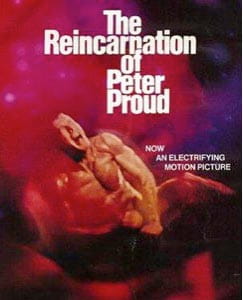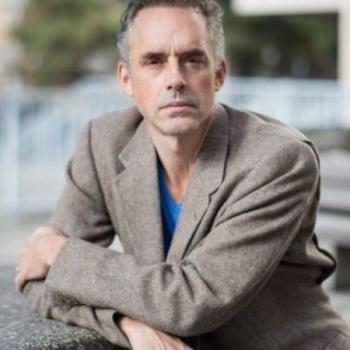By Beth Davies-Stofka
 Reincarnation is not a particularly dominant theme in American popular culture. Our novels, comics, television shows, songs, and movies are much more concerned with themes of death and redemption, heaven and hell. But in those instances in which artists and writers tackle reincarnation, they tend to share a common interest: our potential consciousness of past lives. How much can we know? And what happens when we find out? We need a term for this. Let's call it "past-life awareness."
Reincarnation is not a particularly dominant theme in American popular culture. Our novels, comics, television shows, songs, and movies are much more concerned with themes of death and redemption, heaven and hell. But in those instances in which artists and writers tackle reincarnation, they tend to share a common interest: our potential consciousness of past lives. How much can we know? And what happens when we find out? We need a term for this. Let's call it "past-life awareness."
Past-life awareness was the theme of Alan Jay Lerner's 1965 Broadway musical On A Clear Day You Can See Forever, made into a film in 1970 by Vincente Minelli and starring Barbra Streisand and Yves Montand. Streisand played clairvoyant Daisy Gamble, who sees psychiatrist Marc Chabot (Montand) for help quitting smoking. Gamble's past lives are revealed under hypnosis, providing abundant cinematic opportunities for fantasy sets and personality changes. Gamble also knows her future lives, and her predictions suggest that various souls travel together, so to speak, continually reincarnating into new relationships with each other. Let's call this "cohort reincarnation."
Past-life awareness was also explored in the 1975 film The Reincarnation of Peter Proud, directed by J. Lee Thompson (Cape Fear). Based on a 1973 novel by Max Ehrlich, The Reincarnation of Peter Proud was a supernatural thriller about a college professor whose pursuit to find the meaning behind debilitating nightmares leads him to Springfield, Massachusetts, where he encounters prominent locations and landmarks from his dreams, and then the woman from his dreams. It turns out Professor Proud is the woman's dead husband reincarnated, and this does not bode well for anyone involved.
The search for reincarnated family members provided the plot for another 1970s supernatural thriller, Audrey Rose (1977). Based on the novel by Frank De Felitta, Audrey Rose also used nightmares as a pretext for mysteriously reuniting a reincarnated soul with a still-living relative. In this case, eleven-year-old Ivy Templeton's terrifying nightmares seem to be explained when a stranger named Elliot Hoover appears claiming that Ivy is the reincarnation of his daughter, Audrey Rose. The movie makes explicit references to Hinduism, and closes with a quotation from the Bhagavad-Gita.
More recently, the terrific thriller Dead Again (1991) enveloped reincarnation in mystery and paranoia, stirring up the nerve-wracking proposition that the same experiences of betrayal, madness, and violence could follow us from one life to the next. Directed by Kenneth Branagh and starring Branagh and Emma Thompson, Dead Again took the ideas of past-life awareness and cohort reincarnation and wove them into a noir nail-biter that kept us guessing until the end.
Popular fiction is not alone is proposing the idea of cohort reincarnation. The idea has received extensive therapeutic attention from psychotherapist Brian L. Weiss, M.D. (Many Lives, Many Masters). Weiss provides case studies from his private practice in which patients explore past lives while under hypnosis. Weiss also hypothesizes that groups of souls reincarnate together again and again, often in very different relationships. Your husband today might have been your headmistress or your faithful hunting dog in a past life.
Dr. Ian Stevenson (1918-2007), biochemist and professor of psychiatry, published scientific studies in support of reincarnation in peer-reviewed journals. Director of the University of Virginia's Division of PerceptualStudies until his retirement in 2002, Stevenson focused his research on children said to have past life memories. Stevenson assiduously documented the children's stories and then pursued verification of the facts these children reported, facts they presumably could not have known. Stevenson even sought physical correlations between the child and the dead person allegedly remembered by the child.
Needless to say, Stevenson's work is controversial. Scientists disagree over the integrity of his method, with some dismissing it as pseudoscience and others affirming its rigor. However, despite their differing positions on his method, Stevenson's conclusions have generally been rejected by his peers, as he was unable to propose a process by which a personality might survive a death and then transfer to another human body.
The lack of interest in reincarnation displayed by scientists and skeptics is mirrored in science fiction. Sci-fi overwhelmingly prefers themes of apocalypse, utopia, and dystopia to the theme of reincarnation. However, a number of writers have expressed interest in the idea (perhaps not so crazy) that the time will come when our technologies will enable us to capture our personalities and upload them to a safe mainframe, to be downloaded again into successive physical hosts, whether biological or cybernetic.





